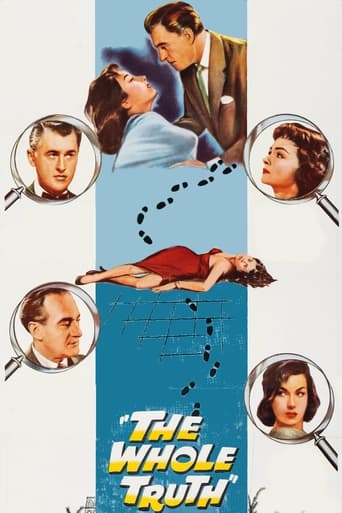JohnHowardReid
Directed by JOHN GUILLERMIN. Screenplay by Jonathan Latimer. From the play by Philip Mackie. Assistant director: Ronald Spencer. Director of photography: Wilkie Cooper. Art director: Tony Masters. Film editor: Gerry Hambling. Production manager: Jack Hicks. Camera operator: Hughie Wilson. Set continuity: Yvonne Richards. Sound recordists: F. Ryan, Bob Jones, John Aldred. Sound editor: Teddy Darvas. Make-up: Roy Ashton. Hairdresser: Bill Griffiths. Wardrobe supervisor: Bridget Sellers. Music composed by Mischa Spoliansky; conducted by Lambert Williamson; played by Johnny Dankworth and His Orchestra. Produced by Jack Clayton. A Romulus Film. A Columbia Picture.A Romulus Production. London trade show: June 1958. No New York opening. U.S. release through Columbia: September 1958. U.K. release through Columbia: 3 August 1958. Australian release: 7 May 1959. 86 minutes.SYNOPSIS: An American film producer is accused of murdering his star. Setting: the French Riviera.COMMENT: Crisp thriller screen-played by Jonathan Latimer (who worked with director John Farrow on such classics as The Big Clock, Beyond Glory, Night Has a Thousand Eyes, Alias Nick Beal, Plunder of the Sun, etc., and also authored interesting mystery novels on his own account, featuring private detective Bill Crane) with an interesting movie-making background on the French Riviera. Splendid performances by the principals and taut, inventive direction by John Guillerman keep the viewer almost constantly on the edge of his or her seat. Production credits are first-rate.
gridoon2018
Smoothly directed by John Guillermin (who, 20 years later, would helm my favorite Agatha Christie film adaptation, "Death On The Nile") and intelligently acted by a capable cast (including sultry Italian star Gianna Maria Canale), "The Whole Truth" is a slick, well-made mystery movie. It's not, however, a whodunit, like its poster claims; we learn who the killer is early on. It's more of a cat-and-mouse game between the killer and the hero. Nevertheless, there are quite a few surprising plot developments. Also of note is the lively, jazzy music score by Johnny Dankworth and Lambert Williamson. Not a great film, but one that deserves to be better known. **1/2 out of 4.
RanchoTuVu
A film producer accused of murdering the leading lady of his latest project must acquit himself and save his marriage. Stewart Granger was more than apt at the part of the producer and his relationship with Donna Reed (who plays the part of his wife) is full of fairly intelligent dialogue. George Sanders' character as the actual killer of the leading lady, who had totally humiliated him with her numerous affairs, makes convincing sense as the plot unfolds of an older man confronted with a marriage that's only evidence of matrimony was the worthless piece of paper the marriage certificate was written on. The ending is a bit of a stretch, but there are a lot of nice interior shots of the jet set enjoying a swanky party on the French Riviera where the story takes place.
Single-Black-Male
It's a pity that Granger wasn't teamed up against George Sanders in the same way that he was against James Mason. I think their standoff would have made a good fight sequence in a swashbuckler like 'Moonfleet'.A good yarn, but disposable after the first watch.



